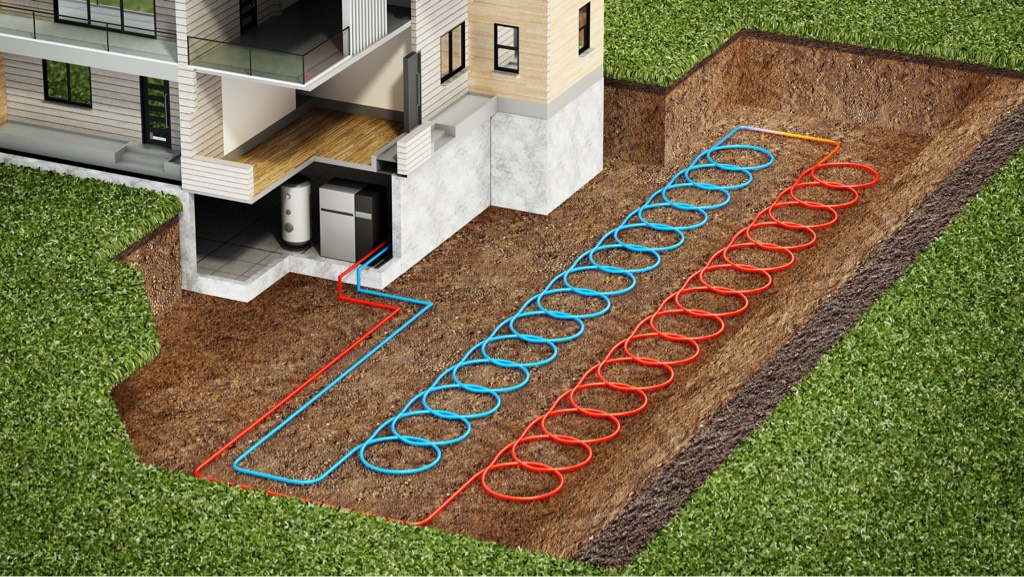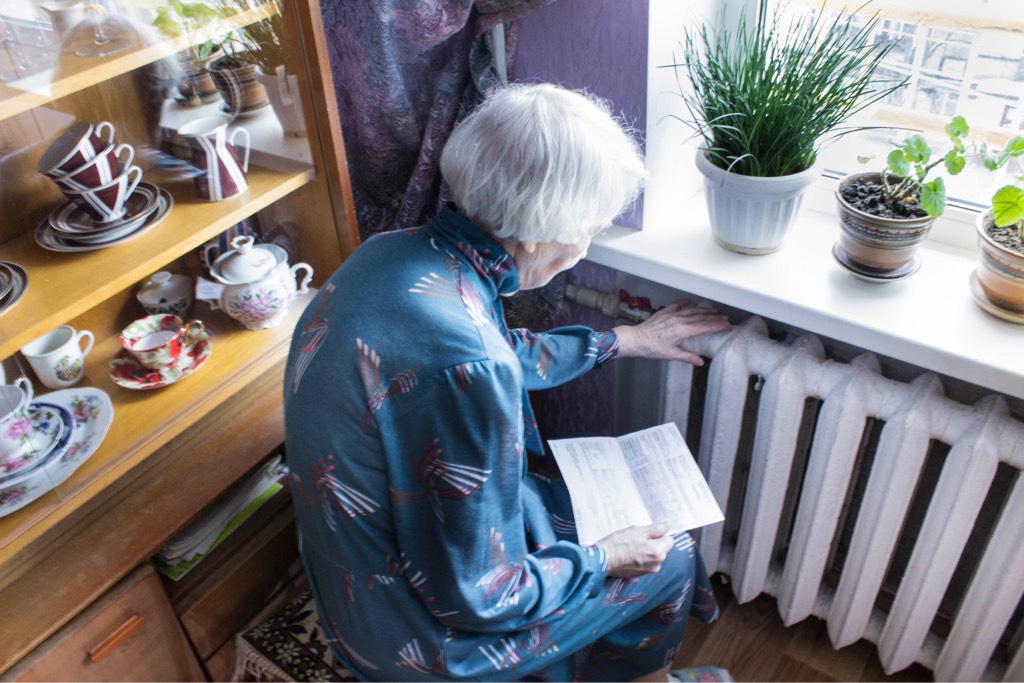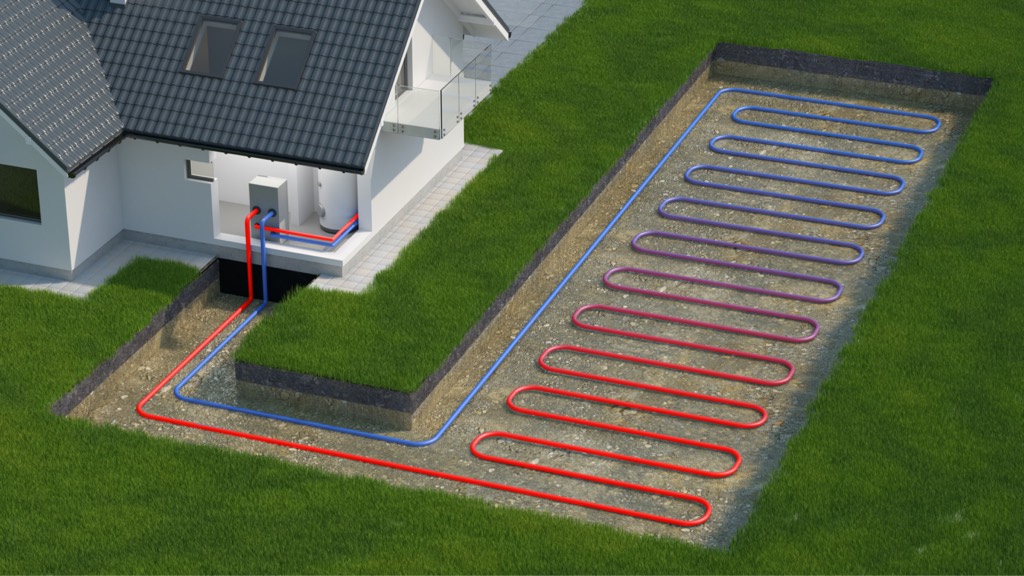How does a ground source heat pump work?
We have experienced some very hot summers in recent years. We have also had period of snow and ice. It’s quite hard to imagine that under our feet the temperature of the earth remains very stable.
But believe it or not, once you dig two metres down into the earth, the temperature of the ground is always between 8°c and 12°c. This is independent of the air temperature and weather conditions going on above. A ground source heat pump system takes advantage of this stable underground temperature by using the warmth from the earth to heat your home.
The system outside your home
To install a ground source heat pump, the engineers lay a network of energy-absorbing pipes either horizontally or vertically through the ground. These carry thermal transfer fluid – a mixture of cold water and antifreeze. Because heat always travels from warmer to cooler areas, the thermal transfer fluid absorbs heat from the ground as the system pumps it through the pipework. The pump then heats it further upon its return to your house.
The system inside the building
Once the thermal transfer liquid reaches the house, it flows into a compressor. The compressor uses pressure to raise the temperature of the liquid. A heat exchanger then transfers this heat into a separate tank of water and this water then circulates through the heating system in your house. The water never mixes with the thermal transfer fluid. After the thermal transfer fluid has deposited its heat into the water it returns to the energy-absorbing pipes in the ground to absorb more heat. The whole process works a lot like a fridge in reverse.
This system of heating is incredibly flexible. It utilises underground heat, which is stable regardless of location, and works efficiently in almost all geological conditions. However, in some rare situations the thermal conductivity of the ground is too low and may not transfer sufficient heat to the thermal transfer liquid. We always recommend that you get a professional survey to determine whether your property is suitable before installation begins.

What’s the difference between a ground source heat pump and traditional heating systems?
On a very basic level, both ground source heat pumps and a common boiler system use the same technology. In both cases heated water is transported through the central heating system to warm your house via radiators or underfloor heating systems.
The difference, however, comes from the source of that initial heat. Traditional heating systems rely on a boiler. This heats the water in the system using gas, oil, electricity, or renewable fuel such as wood pellets. As we explained above, a ground source heat pump uses residual heat in the ground underneath your home rather than a fuel like gas.
A traditional heating system may seem like a much simpler way to heat your home. So why should you consider investing in a heat pump system?
The savings on offer
Ground source heat pumps cause far lower carbon emissions than a traditional heating system. This makes them much more environmentally friendly and will also reduce your energy bills. The pump itself uses electricity, so it cannot be classed as 100% carbon free. But, there is still a huge reduction in the amount of non-renewable energy consumed. The table below uses figures from the Energy Saving Trust to indicate carbon dioxide and energy bill savings for a ground source heat pump compared to a traditional heating system. These figures take into account the current energy price cap in England, Scotland, and Wales. Savings are based upon a well-insulated four-bedroom detached home.
| Existing System | Annual energy bill savings | Annual carbon dixoide savings |
| Gas | £14 – £1,000 | 3,000 – 6,000 kg |
| Electric | £1,100 – £2,000 | 2,400 – 3,500 kg |
| Oil | £640 – £2,400 | 4,300 – 9,000 kg |
| LPG | £1,500 – £3,600 | 3,500 – 6,500 kg |
| Coal | £540 | 12,000 kg |
The variation in savings within each category is largely due to the age and efficiency of the incumbent system. However, in almost all cases it is clear that upgrading the heating system would save a significant amount of money, as well as reducing your household’s carbon dioxide emissions. These savings are, in part, so significant because these systems are so efficient at converting heat from the ground into usable heat in the home. You can read more about the efficiency of heat pumps later on in this article.
The long lifespan
Another significant factor in the debate is that of lifespan. Whilst the average homeowner can expect to replace their traditional boiler every 10 to 15 years, the external pipework of the heat pump has an incredible lifespan up to 80 years. What’s more, the internal pump system only requires attention every 25 years or so. We all know how much inconvenience and upheaval is involved when something like a heating system needs replacing. So avoiding this much disruption is definitely an appealing process.
Installation costs
One of the primary concerns for homeowners thinking about whether to invest in a ground source heat pump system is the cost of installation. Compared to the average installation of a traditional heating system, the cost of setting up the system is significant, with prices ranging between £16,000 and £35,000. However, homeowners who wish to upgrade can access plenty of government grants. These can significantly reduce the cost of installation. Those who outlay the initial investment will reap financial benefits in the long term, particularly with monthly bills. For more information on the cost of installation and grants available for renewable heating systems, read our article on funding for heat pumps.
Long term benefits
In the short term, it might seem more straightforward to plump for a traditional heating system. But with energy costs rising, not to mention the climate emergency, we believe this is a false economy. It is true there is a psychological barrier for many homeowners in switching to a non-traditional heating system. But those who are willing to make the initial investment will secure a pay off in years to come.
What types of ground source heat pumps are there?
Now let’s drill a bit deeper into the different types of systems available.
Open and closed loop systems
Most ground source heat pump systems are closed loop systems. This means that they recycle the thermal transfer fluid. The system repeatedly heats and cools the liquid as it moves it between the ground pipework and the pump.
An open loop system takes water from a nearly source, such as a river or a lake. It extracts the heat from this water and then returns the water to its original source, or somewhere else at ground level. The open loop system requires proximity to a large water source of a suitable depth. Environmental regulations govern the extraction and release of the water, which makes this option less popular than a closed loop system. But if your location permits it, the simplicity of an open loop system means the installation price is far lower than a regular closed loop system.
Horizontal and vertical systems
There are two types of closed loop systems – horizontal and vertical. Both systems heat water in the same way. With a vertical system, the installer places the pipes into a deep bore hole. With a horizontal system, they arrange the pipes in a horizontal array at a much shallower depth.
As the temperature below ground remains constant to a significant depth, there is no thermal variation between horizontal and vertical systems. But the horizontal system requires your property to have more space outdoors where the pipework can be installed. A vertical system is preferable for those with smaller gardens, as a horizontal system will require at least half an acre of land. Unfortunately however, a vertical system costs much more to install due to the labour involved in drilling the deep boreholes.
How efficient are ground source heat pumps?

The primary appeal of ground source heat pumps is their efficiency.
Heat pump efficiency is measured by its Coefficient of Performance, or CoP for short. This is the ratio of how much energy is produced vs. how much electrical energy the system requires to run. It is not possible to provide a standard CoP for all heat pumps as the CoP will vary depending on individual factors at each site. However, a CoP of 4 is pretty typical. This means that for each 1kW of electricity used to run the pump, 4kW of heat is produced (statistics from the Centre for Sustainable Energy).
This is vastly more efficient than traditional heating systems. A modern condensing boiler may be 90% efficient, while a heat pump system can reach 400% efficiency. They produce more energy than they consume, which can only mean good things for your wallet and for the planet.
Alternatives to ground source heat pumps
Air source heat pumps
If you’re looking for an efficient system to heat your home, you may also want to research air source heat pumps. These work in a very similar way, but harness heat from the air rather than from the ground. Air source heat pumps are simpler and quicker to install and therefore much cheaper g, but their efficiency is more variable. If you want to read more, have a look at our comparison of air source and ground source heat pumps.
Traditional heating systems
Of course, you may want to retain your current method of heating your house through a traditional fuel boiler. Earlier in this article we gave a fuller comparison of how ground source heat pumps differ from this, and we would encourage you to consider this more efficient method to heat your home.

